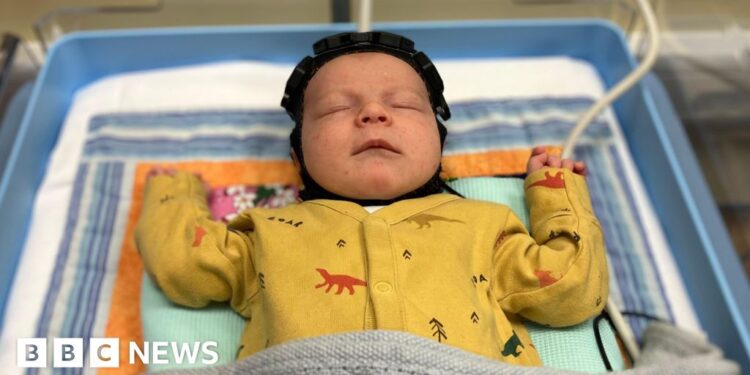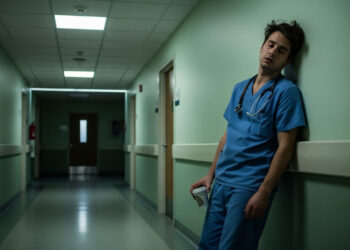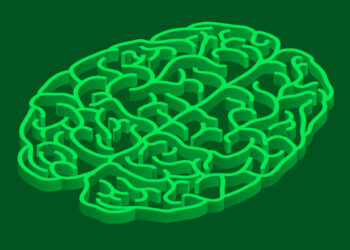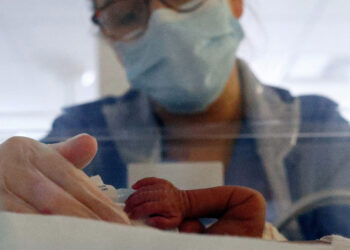Janine MachinEast of England technology correspondent, in Cambridge
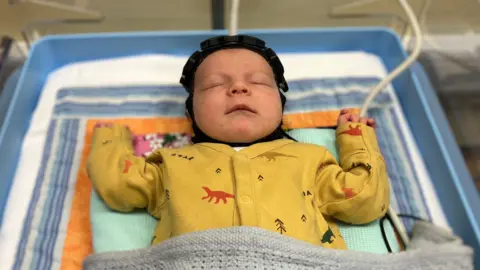 BBC
BBCThree-week-old Theo is fast asleep in a cot, unaware he is helping to trial new technology that could change the lives of others.
Dr Flora Faure is gently fitting him with a small black cap that looks like a swimming cap, or something a rugby forward might wear.
It is covered with hexagonal lumps, containing technology that monitors how his brain is working.
Researchers at the Rosie Maternity Hospital in Cambridge say they are the first in the world to trial a new technique that could speed up diagnosis and care for children with conditions such as cerebral palsy, epilepsy and learning difficulties.
It could be available in UK hospitals within the decade.
“It’s the first time that light and ultrasound have been used together like this to give a more complete picture of the brain,” says Dr Faure, a researcher from the Fusion (Functional UltraSound integrated with Optical Imaging in Neonates) study.
In the weeks leading up to and following birth, our brains change every day.
Brain injury in newborns is a major reason for lifelong disability, and a programme to reduce brain injury in childbirth is currently being rolled out across the NHS.
The injury can affect the brain’s ability to communicate with the body, leading to conditions such as epilepsy, which causes seizures, or cerebral palsy, which affects movement and coordination.
It is more common in premature births but can be caused by a number of issues, including oxygen deprivation, haemorrhage, infection or birth trauma.
But for the five in every 1,000 babies who have a brain injury, the current monitoring methods struggle to predict how and to what extent the child will be affected as they grow.
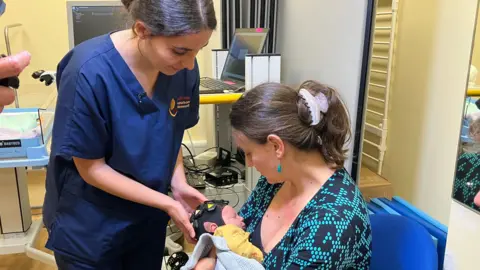
Explaining how the cap works, Dr Faure says: “The light sensors monitor changes in oxygen around the surface of the brain – a technique known as high-density diffuse optical tomography – and the functional ultrasound allows us to image the small blood vessels deep in the brain.”
But the device is also different because it is portable, so it can monitor babies more regularly, and from the comfort of their cot.
Consultant neurosurgeon Dr Alexis Joannides believes it could have several advantages over the traditional MRI (magnetic resonance imaging) or CUS (cranial ultrasound) scans.
“MRI has limitations for two reasons: one is the cost and availability of scan slots,” he explains.
“The other is that you have to take the baby to a noisy scanner, wait maybe 20 minutes for the scan and then take the baby back again.
“It means, realistically, you can’t perform a series of scans, but in those first weeks, the brain can change daily so having a way of doing repeated tests is incredibly powerful.”
MRI and CUS are also considered to have limited ability to predict the nature of any impairment due to the complex relationship between brain structure and function, although a study led by Imperial College London in 2018 reported that accuracy could be enhanced with an additional 15-minute scan.
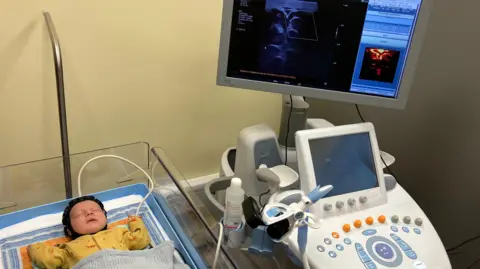
By conducting regular tests on infants, it is hoped that problems will be identified much earlier, and therapies and interventions can begin sooner.
The charity Action Cerebral Palsy has welcomed the research.
“For many children with cerebral palsy, the road to diagnosis is a long one, and families can spend years knowing their child is ‘at risk’ of developmental issues but not fully understanding what that will mean,” says its founder Amanda Richardson.
“Technology like this could make all the difference, but it’s important that the capacity of community therapists is boosted to keep up with demand, as there is already a long wait for help.”
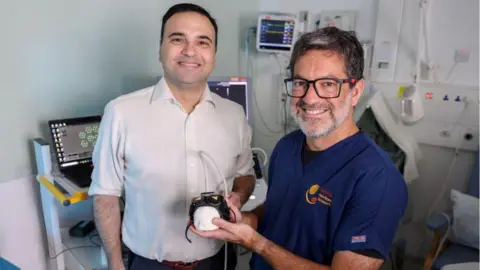 Cambridge University Hospitals NHS Foundation Trust
Cambridge University Hospitals NHS Foundation TrustProf Topun Austin is a consultant neonatologist and director of the Cambridge University Hospital’s Evelyn Perinatal Imaging Centre. His research focuses on brain treatments at the extremes of life – young and old.
He explains: “The Fusion study aims to develop and demonstrate a system for the cot-side assessment of brain activity in newborn infants and is currently the first of its kind in the world.
“We have spent 12 months successfully proving the concept with the help of healthy and premature babies and will now focus on babies considered to be at higher risk of brain damage.
“Understanding brain activity patterns in both term and preterm infants can help us identify those most vulnerable to injury at an early stage.”
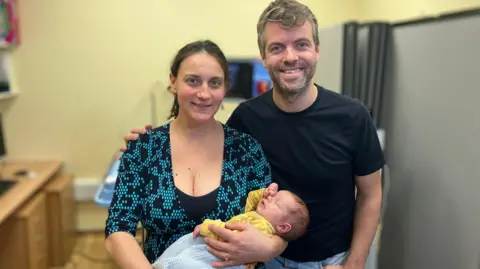
Theo is one of the healthy term babies taking part in the trial, but his mother, Stani Georgieva, feels it is important to contribute.
“His dad and I are both scientists and when Theo grows up he’ll be able to take advantage of all of the advancements that have been made through research, so we felt it was important for him to be a little part of that understanding,” she says.
Dr Joannides is also co-director of the NIHR HealthTech Research Centre in Brain Injury, based in Cambridge. It exists to help develop new technologies to improve the lives of people with brain injury.
The centre has funded a researcher for the study and will lend its expertise to help roll out the device across the NHS, should the study prove successful.
“We still have hurdles to overcome, but we hope, within three to five years we’ll have a product that can be evaluated more widely,” he says.
“Cost permitting, it could not only monitor babies with a known problem, but also be a screening tool to help identify others who may be at risk.”
Source link : https://www.bbc.com/news/articles/cly42gvrq2ko?at_medium=RSS&at_campaign=rss
Author :
Publish date : 2025-11-07 01:50:00
Copyright for syndicated content belongs to the linked Source.

